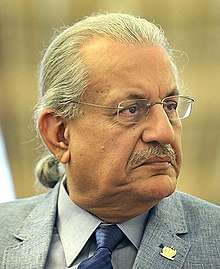Raza Rabbani
| Raza Rabbani | |
|---|---|
 | |
| 7th Chairman of the Senate of Pakistan | |
|
In office 12 March 2015 – 11 March 2018 | |
| Preceded by | Nayyar Hussain Bukhari |
| Succeeded by | Sadiq Sanjrani |
| Minister of State for Law and Justice | |
|
In office 19 October 1993 – 5 November 1996 | |
| Prime Minister | Benazir Bhutto |
| Preceded by | Saima Akhtar Bharwana |
| Succeeded by | Tehmina Daultana |
| Personal details | |
| Born |
Mian Raza Rabbani 23 July 1953 Lahore, Punjab, Pakistan |
| Political party | Pakistan Peoples Party |
| Alma mater | University of Karachi |
| Awards | Nishan-e-Imtiaz |
Mian Raza Rabbani (Urdu: رضا ربانى; born 23 July 1953) is a Pakistani politician who served as the 7th Chairman of the Senate of Pakistan from March 2015 to March 2018.
He has been elected a senator six times since 1993 from the Sindh Province. He was a close aide to Benazir Bhutto who had appointed him the party’s deputy secretary general in 1997 and leader of the opposition in the Senate in 2005. Rabbani has served as Federal Minister for Inter-Provincial Coordination, Minister of State for Law and Justice, and Leader of the House and Opposition in the Senate. Raza Rabbani was unanimously elected as the Chairman of the Senate of Pakistan in March 2015.
Early life and education
Rabbani was born on 23 July 1953[1] in Lahore, Punjab.[2][3] in famous Arain Family. He spent his childhood in Karachi.[3]
Rabbani received his early education from Habib Public School in Karachi. He received his BA and LLB. (Bachelor of Law) degrees from the University of Karachi[3][4][5][1] in 1976 and 1981, respectively.[6]
Rabbani was politically active during his university years at the University of Karachi[5] and was head of Liberal Students Federation in 1974.[7] He is said to have affiliated with Pakistan Peoples Party (PPP) since 1968.[1][2] He was in jail during the rule of Zia u Haque.[3] when he received his LLB. degree in 1981.[6][5]
He started practising law after the completion of his studies.[3]
Political career
Rabbani started his political career through PPP in the 1981.[5][4]
He was elected to the Parliament in Pakistani general elections, 1988 and served as an advisor to Chief Minister of Sindh from 1988 to 1990.[4][5][1][3]
He was elected to the Senate of Pakistan for the first time in 1993[3] where he served until 1999.[4][1]
He was inducted into the federal cabinet in 1994 and appointed as the Minister of State for Law and Justice[3] during the second government of Benazir Bhutto[5] where he served until 1996.[4][1][8]
In 1996, he became the Deputy Leader of the Opposition in the Senate.[4] In 1997, he was appointed as the deputy secretary general of PPP by Benazir Bhutto.[3]
He was re-elected to the Senate in 2003 for three years.[4][1]
He remained Leader of the Opposition in the Senate from 2005 to 2008.[4][3] After PPP won the election in 2008, he refused to become a member of the federal cabinet of Yousaf Raza Gillani due to issues of taking oath from then president of Pakistan Pervez Musharraf.[3]
He was re-elected to the Senate in 2006 for six years.[4][1]
He remained Leader of the House in the Senate from 2008 to 2009.[4]
After Musharraf left the office of Presidency in 2008, Rabbani was inducted into the federal cabinet with the rank of federal minister[3][9][5] and appointed as Advisor to the Prime Minister on Inter-Provincial Coordination where he served until 2009 when he resigned[1][10] after he was nominated by PPP as chairman of the Senate.[3]
In 2011, he was inducted into the federal cabinet with the rank of federal minister[11]and appointed as the Federal Minister for Inter-Provincial Coordination and Human Rights where he briefly served from February 2011 until his resignation in May 2011.[1][2][12]
Later he went on to serve as the chairman of the parliamentary committee for constitutional reform and chairman of the Parliamentary Committee on National Security.[3]
He was inducted into the federal cabinet and served as Advisor to the Prime Minister from March 2010 until his resignation in February 2011 in protest against Asif Ali Zardari's decision to form a coalition with the PML (Q).[1][3]
He was re-elected to the Senate in 2012 for six years.[4][1]
After the PPP lost the 2013 general election, he was made additional secretary general of PPP by Zardari.[3]
In July 2013, he was nominated by PPP as their candidate for the presidential office.[13]
Rabbani has been awarded Nishan-e-Imtiaz for his parliamentary services.[4][1]
He is a recipient of Nishan-i-Imtiaz, for his parliamentary work.[3]
Views on national security
Despite his disagreements with PPP's leadership, Senator Rabbani was named by the President to be the Chairperson of the Parliamentary Committee on National Security and the Chairperson of the Parliamentary Committee on Constitutional Reform in 2008.[14]
His services and credentials led to his simultaneous appointment to the chairmanship of the Beginning of the Rights of Balochistan where he worked on presenting a package to redress the problems of the Balochistan Province to the joint sessions of the Parliament.[15] Despite his recommendations, none of the provisions in the packages would be carried out by Prime Minister Yousaf Raza Gillani who would later entangle with the Supreme Court over the missing persons scandal.[16] In 2003, Rabbani demonstrated his opposition against the Iraq war in 2003, over the issue of its nuclear program.[17]
About the atomic proliferation issues, Rabbani criticised the President Pervez Musharraf in the news channels and publicly supported the case of Dr. AQ Khan against President Musharraf.[17] While calling for moral responsibility of nuclear weapons and security, he reportedly marked his words over this issue as the "propaganda against Pakistan in the Western Media about terrorism and nuclear weapons, raising legitimate apprehensions in the minds of Pakistanis."[17]
During the height of the United States-Pakistan border confrontations, Rabbani declared to the media about the shift-changing policy of Pakistan as United States' ally and quoted: "We need to prioritize our own national-security interests. As far as the U.S. is concerned, the message that has gone with this resolution will definitely ring alarm bells, vis-à-vis their policy of bulldozing Pakistan."[18]
In April 2011, Rabbani also heavily criticised the US over their drone operations in North-Western Pakistan in the Parliament, commenting that United States is following a major violation of international law and human rights.[19]
Writings and political philosophy
Rabbani has written in support of socialism, communism, constitutional justice, and left-wing ideas. In 2003, he authored a book, "LFO: a fraud on the Constitution", in a direct opposition to President Pervez Musharraf and a scheme of legitimising his rule.[20][21]
In response to insurgency situation in the country, Rabbani reputedly declared that "Politico-religious parties and right-wing political groups are conniving with the establishment to damage and weaken left-wing parties."[22] His statement came during the 2013 general elections, in which, left-wing parties were under immense pressure from the right-wing insurgent groups to limit their political campaigns.[22] Rabbani later accused the international community for supporting the conservative parties in an opposition against the leftist parties.[22] While accusing former president Parvez Musharraf for supporting the ultra-conservative alliance to curb the left-wing parties, Rabbani, with another Marxist Taj Haider, accused the West and the United States of supporting right wing parties for their bid in the elections.[23]
Writings
He is the author of the following books:
- Rabbani, Mian Raza. A biography of Pakistani federalism : unity in diversity. Islamabad: Leo Books. ISBN 9693705505.
- Rabbani, Mian Raza (2003). LFO : a fraud on the Constitution. Q.A. Publishers. p. 241.
- Mian Raza Rabbani; Fouzia Saeed; Maliha Hussain. Raza Rabbani : a national hero. Islamabad: Mehergarh Research and Publications. ISBN 9699659084.
- Rabbani, Mian Raza. Invisible People. Lahore: Sang-e-meel Publications. ISBN 9693530004.
| Political offices | ||
|---|---|---|
| Preceded by Nayyar Hussain Bukhari |
Chairman of the Senate of Pakistan 2015-2018 |
Succeeded by Sadiq Sanjrani Incumbent |
References
- 1 2 3 4 5 6 7 8 9 10 11 12 13 "Profile". senate.gov.pk. Senate of Pakistan. Retrieved 22 May 2017.
- 1 2 3 "Profile: Hello Mr chairman - The Express Tribune". The Express Tribune. 13 March 2015. Retrieved 22 May 2017.
- 1 2 3 4 5 6 7 8 9 10 11 12 13 14 15 16 17 "Raza Rabbani — Pakistan's 'Mr Clean'". DAWN.COM. 12 March 2015. Retrieved 25 August 2017.
- 1 2 3 4 5 6 7 8 9 10 11 12 "Profile of Senate Chairman Raza Rabbani". Aaj News. 12 March 2015. Retrieved 22 May 2017.
- 1 2 3 4 5 6 7 "Mian Raza Rabbani". DAWN.COM. 23 April 2013. Retrieved 22 May 2017.
- 1 2 "An interview with Senator Raza Rabbani:" (PDF). Forum FED. Retrieved 22 May 2017.
- ↑ Paracha, Nadeem F. (23 August 2012). "Born to run: The rise and leveling of the APMSO". DAWN.COM. Retrieved 22 May 2017.
- ↑ "PM appoints Senator Raza Rabbani as Advisor". GEO. 18 March 2010. Archived from the original on 10 October 2012. Retrieved 22 May 2017.
- ↑ "Fahim inducted among 40 new ministers". DAWN.COM. 4 November 2008. Retrieved 22 May 2017.
- ↑ "Raza Rabbani quits cabinet". DAWN.COM. 10 March 2009. Retrieved 22 May 2017.
- ↑ Newspaper, From the (12 February 2011). "Some heavyweights left out of 22-member new cabinet". DAWN.COM. Retrieved 22 May 2017.
- ↑ Newspaper, From the (2 May 2011). "Rabbani quits cabinet". DAWN.COM. Retrieved 22 May 2017.
- ↑ "Raza Rabbani nominated PPP presidential candidate". DAWN.COM. 20 July 2013. Retrieved 25 August 2017.
- ↑ http://geographicalmedia.com/raza-rabbani/activity
- ↑ Hoodbhoy, Nafisa (2010). Aboard the democracy train : a journey through Pakistan's last decade of democracy. London: Anthem. ISBN 0857289675.
- ↑ Hasnat, Syed Farooq. Global security watch—Pakistan. Santa Barbara, Calif.: Praeger. ISBN 0313346984.
- 1 2 3 Staff Report (25 April 2003). "Opposition seeks resolution of LFO deadlock: Rabbani". Daily Times, Pakistan. Retrieved 26 July 2013.
- ↑ Researcher, ed. by CQ. Issues in peace and conflict studies : selections from CQ researcher. Los Angeles: SAGE. ISBN 1412992915.
- ↑ Kabir, Nahid Afrose. Young American Muslims : dynamics of identity. Edinburgh: Edinburgh University Press. ISBN 0748669930.
- ↑ Rabbani,, Mian Raza (2003). LFO : a fraud on the Constitution. Q.A. Publishers. p. 241.
- ↑ https://openlibrary.org/a/OL1528329A/Mian-Raza-Rabbani
- 1 2 3 GM Jamali (7 May 2013). "Establishment wants right-wing in power: Rabbani". Express Tribune, 7 May 2013. Retrieved 27 July 2013.
- ↑ Ali, Rabbia (30 April 2013). "United we stand: The Left-wing!". TEX. Retrieved 27 July 2013.



